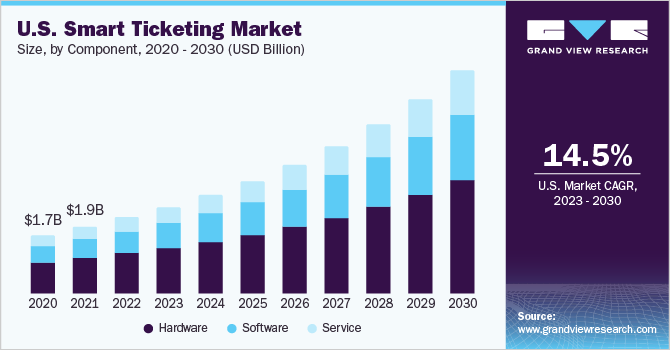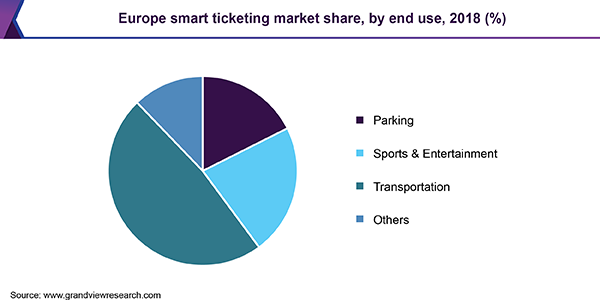
Smart Ticketing Market Size Worth $33.7 Billion by 2026
The global smart ticketing market size is expected to reach USD 33.7 billion by 2026, registering a CAGR of 14.9% from 2019 to 2026, according to a new report by Grand View Research, Inc. Increase in demand for smart ticketing solutions in the travel and tourism industry owing to its ease of use and convenience, and growing reliance on online transactions are expected to drive the market over the forecast period. In addition, upsurge in intelligent transportation systems across the globe is further fueling the market growth.
The rising popularity of blockchain in smart ticketing is expected to drive market growth over the forecast period. Increasing demand for mobile apps and contactless bank cards for smart ticketing solutions is further anticipated to drive the global market. These ticketing solutions are compatible with existing smart systems and infrastructure and can hence be easily integrated with the ticketing systems.
Smart ticketing solutions offer a convenient travel experience to passengers. Moreover, these solutions help improve customer engagement through a range of value-added services. These ticketing solutions enable access to a range of passenger data on the transport network, which can be used to improve customer experiences and services. The passenger data enables transport operators to securely and easily transfer ticket information from physical to virtual smart cards.
Numerous smart ticketing apps provide passengers with an intuitive interface to purchase, use, and manage tickets on a mobile device. Customers can also download tickets securely and quickly over the internet. The card management system solution manages smart cards and customer information to enable operators to issue new cards and also provide effective customer support. These cards enable passengers to securely book their tickets and make payments online.
Smart ticketing technology integrates back-office processing and analytics systems with smart cards, mobile applications, and web portals to deliver comprehensive solutions to local authorities and transport operators. This technology allows easy management of transaction data. Moreover, these ticketing solutions help travelers consolidate multiple tickets for all modes of transport. This, in turn, is expected to create growth opportunities for the market over the forecast period.
Component Insights
Based on component, the market has been segmented into hardware, software, and service. The software segment is expected to witness significant growth over the forecast period. The smart card software is widely used for managing smart card or smart media lifecycle and applications. These software also automate customer interactions with customer service executives, which eventually helps solve customer issues in an effective manner.
The service segment is expected to register the highest CAGR over the forecast period. Increasing digitalization in ticketing services to provide more convenient travel experience to passengers is expected to contribute to the growth of the service segment over the forecast period. Ticketing as a Service (TaaS) calculates the correct fare and allows passengers to travel across multi-modal transport systems effortlessly.
Product Insights
Based on product, the market has been segmented into e-kiosk, e-ticket, e-toll, request tracker, smart parking system, ticket machine, ticket validators, and others. The e-ticket segment dominated the market in 2018, owing to increased use of e-tickets in sports events. E-tickets offer high security as compared to traditional paper tickets. The growth of this segment is also driven by increasing adoption of smartphones across the globe.
The smart parking system segment is anticipated to register the highest growth over the forecast period. Rising advancements in smart parking technology have enabled vehicle drivers to pay parking fees using smart cards. Also, growing traffic congestion is fueling the demand for improved smart parking solutions. Numerous governments across the globe are investing in smart parking systems, which, in turn, is expected to create growth opportunities for these ticketing solutions over the forecast period.
System Insights
Based on system, the market has been segmented into open payment system, smart card, and near-field communication (NFC). The smart card segment dominated the market in 2018, owing to increased use of online payment methods. These cards enable consumers to make reliable and secure payments. Moreover, continuous innovations for these cards help safeguard confidential information by preventing hacking or theft through card authentication and encryption. They also offer several additional benefits; for instance, they are user-friendly and require minimum human intervention.
The near-field communication segment is expected to register the highest CAGR over the forecast period. Near-field communication systems ensure a secure means to make payments. These systems are widely used in various applications, such as making payments with a contactless card and storing tickets to access transportation gates and parking garages. This, in turn, is expected to propel the segment growth over the forecast period.
End-use Insights
On the basis of end use, the smart ticketing market has been segmented into parking, sports and entertainment, transportation, and others. Smart ticketing solutions are widely used in transport networks that allow travelers to purchase, store, and validate transport tickets using their contactless credit cards or debit cards. These ticketing solutions offer various benefits, such as increased customer satisfaction, cost savings, and business intelligence. This, in turn, is expected to fuel the adoption of smart ticketing solutions, particularly in the transportation sector.
Sports and entertainment is expected to emerge as the fastest-growing end-use segment over the forecast period. In the sports industry, various event organizers are focusing on improving attendees’ ticketing experience by offering convenient and hassle-free options. Smart ticketing solutions help reduce the cash flow and waiting time of customers outside the stadiums. As a result, the sports industry is witnessing rapid increase in adoption of these ticketing solutions.
Regional Insights
Europe dominated the market in 2018 with a market size of USD 4.1 billion. European governments are focusing on sustainable transport policies and digitization of public transit. The growth of the Europe market can also be attributed to the presence of prominent market players’ such as Giesecke & Devrient GmbH, Gemalto NV, and Infineon Technologies AG in the region. Technological advancements have driven smart ticketing solutions companies to adopt technologies such as QR code, bar code, and NFC, ultimately resulting in an increased adoption of these ticketing solutions.
Asia Pacific is expected to emerge as the fastest-growing regional market over the forecast period. Various market players are introducing smart ticketing solutions in the Asia Pacific region, owing to increasing government initiatives to use digital payment in emerging countries such as China and India. For instance, the Indian government has launched the Digital India program in the country. The primary objective of this initiative is to promote digital payment methods across the country. The upsurge of smartphone adoption in Asia Pacific has also resulted in a high demand for mobile-based ticketing applications.
Smart Ticketing Market Share Insights
Key vendors in the market include CPI Card Group Inc.; Cubic Corporation; Confidex Ltd.; Gemalto NV; Giesecke & Devrient GmbH; Infineon Technologies AG; and NXP Semiconductors. Market players are focusing on increasing their presence in the regional markets by offering integrated payment solutions through strategic partnerships with smart ticket operators and developers. In addition, these companies are deploying connected devices and big data analytics to track passenger travel patterns. By tracking their travel patterns, operators can offer customized products and services.
New product development and collaborations are some of the key strategies adopted by market players to gain a competitive edge in the market. For instance, in March 2018, NXP Semiconductors collaborated with Google LLC. Under the collaboration, Google LLC planned to integrate NXP Semiconductor’s MIFARE contactless payment solution with Google Pay to improve the travel experience of customers by allowing them to purchase transport privilege on their phones. Vendors are consistently focusing on innovations to differentiate and personalize their solution offerings for potential customers. They are hence investing in R&D activities for innovating and updating products and ticketing solutions.











